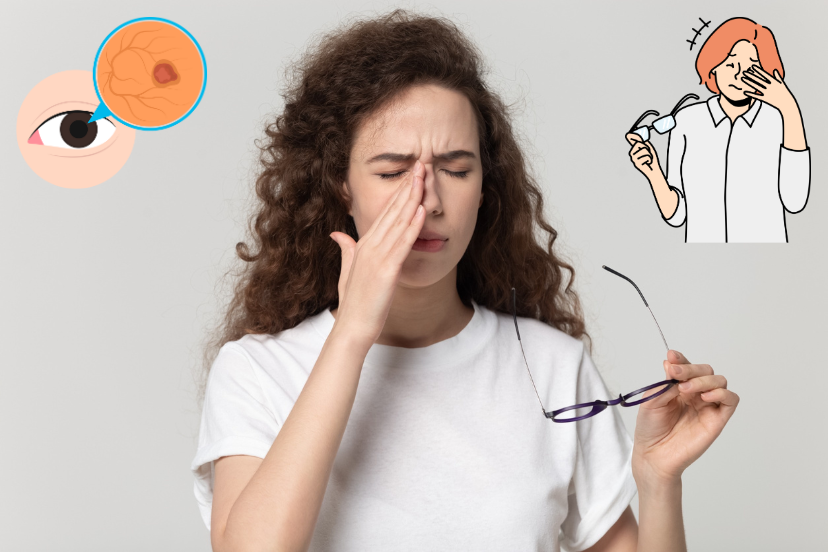Can Dry Eyes Cause Blurry Vision
As a researcher and advisor on vision health, I understand the concerns many people have when it comes to eye-related issues. One common question that often arises is, “Can dry eyes cause blurry vision?” In this article, I will provide helpful suggestions and reasons for my recommendations, addressing the relationship between dry eyes and blurry vision.
Introduction To Dry Eyes And Blurry Vision
Dry eyes, a condition characterized by insufficient tear production or poor tear quality, can lead to discomfort and various visual disturbances. Blurry vision is one such symptom that individuals with dry eyes may experience. Understanding the connection between dry eyes and blurry vision is crucial for managing and maintaining good vision health.
Understanding Dry Eyes
Before delving into the relationship between dry eyes and blurry vision, it’s essential to clearly understand what dry eyes are. Dry eyes occur when the eyes fail to produce enough tears or when tears evaporate too quickly. Tears are vital in keeping the eyes lubricated, nourished, and protected from irritants. Without sufficient tears, the eyes may become dry, itchy, and uncomfortable.
Causes Of Dry Eyes
Dry eyes can be caused by various factors, including environmental conditions, medical conditions, lifestyle choices, and certain medications. Environmental factors such as dry climates, air conditioning, and excessive screen time can contribute to the development of dry eyes. Medical conditions like autoimmune disorders, hormonal changes, and aging can also affect tear production. Additionally, certain medications, such as antihistamines and decongestants, may cause dry eyes as a side effect.
Link Between Dry Eyes And Blurry Vision
The link between dry eyes and blurry vision is multifaceted. When the eyes are dry, the ocular surface becomes irregular, resulting in light scattering differently and causing blurry vision. The inadequate tear film fails to provide a smooth surface for light to pass through, leading to difficulties in focusing and visual clarity. Moreover, the lack of moisture can cause the cornea to become inflamed and swollen, further affecting vision quality.
Common Symptoms
In addition to blurry vision, individuals with dry eyes may experience various symptoms. These include a gritty or sandy sensation in the eyes, redness, itching, stinging, excessive tearing (as a reflex response), sensitivity to light, and discomfort when wearing contact lenses. Paying attention to these symptoms is important as they can provide valuable insights into the underlying cause and severity of dry eyes.
Impact On Vision Health
While dry eyes may seem like a minor inconvenience, they can have a significant impact on vision health if left unmanaged. The constant strain and irritation caused by dry eyes can lead to chronic eye fatigue, which can further affect visual acuity and overall eye comfort. Furthermore, individuals with untreated dry eyes may be at a higher risk of developing corneal ulcers, eye infections, and even long-term damage to the cornea.
Strategies For Relieving Dry Eyes
Thankfully, various strategies and treatments are available to relieve dry eyes and alleviate associated blurry vision. Let’s explore some effective approaches:
Lifestyle Changes
Making certain lifestyle changes can significantly improve dry eyes and reduce blurry vision. It’s important to take regular breaks from prolonged screen time, ensure proper hydration, and maintain a healthy diet rich in omega-3 fatty acids, which can promote tear production.
Home Remedies
Several home remedies can provide relief for dry eyes. These include applying warm compresses to the eyes, practicing gentle eyelid massages, using artificial tears or lubricating eye drops, and maintaining a humid environment.
Medications And Treatments
In more severe cases, medications and treatments may be necessary to manage dry eyes and address blurry vision. These can include prescription eye drops, such as cyclosporine or lifitegrast, which help increase tear production and reduce inflammation. Additionally, procedures like punctual plugs, which involve blocking the tear drainage ducts, can help retain tears on the ocular surface for longer periods.
Prevention And Eye Care
Preventing dry eyes is always better than treating them. Simple preventive measures, such as wearing protective eyewear in windy or dry environments, using a humidifier, and avoiding excessive use of eye-drying substances like alcohol and tobacco smoke, can help maintain optimal eye moisture.
Consultation With An Eye Specialist
If dry eyes persist or significantly affect your vision, it is important to consult with an eye specialist or optometrist. They can assess your condition, identify underlying causes, and recommend suitable treatments or interventions to address dry eyes and alleviate blurry vision.
The Importance Of Regular Eye Exams
Regular eye exams are essential for maintaining optimal vision health and detecting any underlying conditions that may contribute to dry eyes and blurry vision. Eye care professionals can identify early signs of dry eyes, provide appropriate guidance, and prescribe customized treatment plans tailored to your specific needs.
Can Dry Eyes Cause Blurry Vision – Conclusion
Dry eyes can indeed cause blurry vision, and it’s crucial to address this issue promptly to prevent long-term complications and discomfort. By understanding the relationship between dry eyes and blurry vision, recognizing common symptoms, and implementing effective strategies for relief, individuals can regain visual clarity and enhance their overall eye health.
Frequently Asked Questions (FAQs)
1. Can dry eyes cause permanent damage to the eyes?
While dry eyes can cause discomfort and potential complications, prompt management and proper treatment can prevent permanent eye damage. It’s essential to seek professional advice if you experience persistent dry eyes.
2. Are there any natural remedies for relieving dry eyes?
Yes, several natural remedies can provide relief for dry eyes. These include warm compresses, eyelid massages, maintaining a humid environment, and consuming a diet rich in omega-3 fatty acids. However, it’s advisable to consult with an eye specialist before relying solely on natural remedies.
3. How long does it take to treat dry eyes effectively?
The duration of dry eye treatment can vary depending on the underlying cause and severity of the condition. Many individuals experience relief with appropriate interventions within a few weeks or months. However, following the recommended treatment plan and practicing good eye hygiene to prevent recurrence is important.
4. Can over-the-counter eye drops help with dry eyes?
Over-the-counter lubricating eye drops can provide temporary relief for mild to moderate dry eyes. However, it’s crucial to choose drops specifically formulated for dry eyes and avoid those containing preservatives, which can further irritate the eyes. If symptoms persist, consulting with an eye care professional is advisable.
5. Can contact lens wearers experience dry eyes and blurry vision?
Yes, contact lens wearers may be more prone to experiencing dry eyes and blurry vision. Contact lenses can disrupt the tear film and cause moisture loss, leading to dryness and discomfort. It’s important for contact lens wearers to follow proper hygiene practices, use suitable lens solutions, and consult with their eye care provider if dry eye symptoms occur.
Remember, if you’re experiencing persistent dry eyes or blurry vision, it’s always best to seek professional guidance from an eye specialist or optometrist for accurate diagnosis and personalized treatment.




